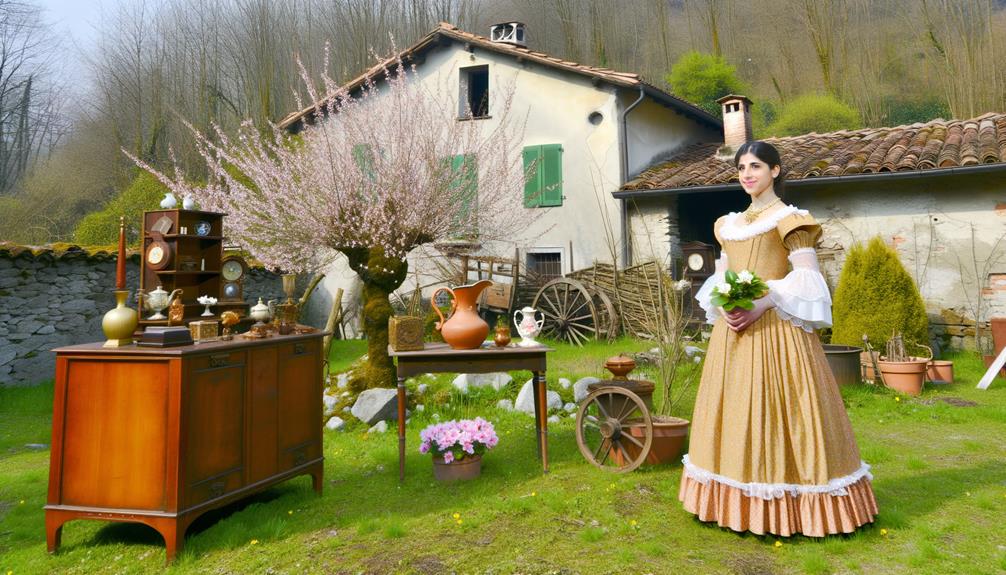Francesca Name Meaning and Origin
Francesca is the Italian feminine form of the Latin name Franciscus, meaning 'French' or 'free one.' The name originates from the Latin term ‘Francus,' denoting a member of the Germanic tribe of the Franks. Francesca gained prominence in Italy during the Middle Ages and has retained its classic charm and cultural richness.
It is linked to historical figures such as Francesca da Rimini, immortalized by Dante in 'The Divine Comedy.' The name's versatility and refined elegance have kept it popular across various European countries. To explore the deep cultural heritage and notable namesakes of Francesca, continue your journey.

Key Takeaways
- Francesca originates from the Latin name Franciscus, meaning 'French' or 'free one.'
- It retains historical roots linked to the Germanic tribe Franks and medieval European culture.
- The name became popular in Italy during the Middle Ages and is associated with St. Francis of Assisi.
- Francesca is culturally significant in literature, notably in Dante's 'Divine Comedy' through the character Francesca da Rimini.
- Variations like Frances and Françoise highlight its adaptability and enduring appeal across different cultures.
Etymology of Francesca
Originating from the Latin name Franciscus, the name Francesca is the Italian feminine form meaning 'French' or 'free one.'
The etymology of Francesca is deeply rooted in the Latin term 'Francus,' which denotes a member of the Germanic tribe, the Franks. Over time, Franciscus evolved to signify a person from France or someone embodying the qualities associated with the Franks, such as freedom and nobility.
The Italian adaptation of the name, Francesca, encapsulates these meanings while adding a distinct cultural flavor. It reflects the historical practice of adapting Latin names across different European languages, thereby preserving their original significance while catering to linguistic and cultural variations.
Historical Background
The historical background of the name Francesca is intricately linked to the cultural and social narratives of medieval Europe. Names in this era often reflected one's lineage, occupation, or place of origin. Derived from the Latin name Franciscus, meaning 'Frenchman' or 'free one,' Francesca became popular in Italy during the Middle Ages.
It was often associated with the rising influence of the Franciscan order, founded by St. Francis of Assisi, a figure renowned for his piety and humility. The name Francesca was also borne by notable historical figures, including Francesca da Rimini, immortalized in Dante's 'Divine Comedy.'
This adoption and adaptation of the name highlight its deep-rooted historical significance and its enduring appeal across centuries.
Cultural Significance
Inextricably woven into the cultural fabric of Italy, the name Francesca embodies a rich tapestry of artistic, religious, and literary significance.
Historically, Francesca has been associated with notable figures in the arts, such as Francesca da Rimini, a character immortalized in Dante Alighieri's 'Divine Comedy.'
The name also carries religious connotations, reflecting the influence of St. Francis of Assisi, whose principles of humility and compassion resonate deeply within Italian culture.
Additionally, the name's Latin roots, meaning 'free,' evoke a sense of independence and strength, attributes highly valued in Italian society.
Therefore, Francesca is not merely a name but a symbol interwoven with Italy's historical and cultural heritage, reflecting its enduring values and artistic legacy.
Literary References
Francesca's presence in literature is prominently epitomized by her tragic narrative in Dante Alighieri's 'Divine Comedy,' where she and her lover Paolo are condemned to the second circle of Hell for their adulterous love affair.
Francesca da Rimini's story, based on real 13th-century figures, serves as a poignant example of the consequences of passion and betrayal. Dante's portrayal captures the intense emotional turmoil and eternal suffering resulting from forbidden love, immortalizing Francesca as a symbol of tragic romance.
Her narrative has inspired numerous adaptations and references in subsequent literary works, highlighting the enduring impact of her tale. This literary representation underscores the name Francesca's association with complex, emotionally charged histories within the broader canon of classic literature.
Famous Namesakes
The name Francesca has been borne by numerous notable figures throughout history, each contributing to the name's rich legacy. From historical personalities like Francesca da Rimini, immortalized by Dante in his 'Divine Comedy,' to the modern-day celebrities such as actress Francesca Annis, the name continues to resonate across different eras and contexts.
This section will explore these distinguished individuals, highlighting their achievements and enduring influence.
Historical Francesca Figures
Among the many notable individuals named Francesca throughout history, two stand out for their significant contributions to the arts and politics. Francesca Caccini (1587–1641) was an influential Italian composer and singer of the early Baroque era, renowned for her opera 'La liberazione di Ruggiero.'
As one of the few female composers of her time, Caccini's work broke gender barriers and expanded the possibilities for women in the domain of arts.
In the field of politics, Francesca Bruni, a 19th-century Italian patriot, played a pivotal role in the Risorgimento movement, fighting for Italy's unification. Her dedication and leadership exemplify the spirit of revolutionary fervor that defined the era, leaving a lasting impact on Italy's national identity.
Francesca in Literature
In literary history, Francesca da Rimini emerges as one of the most enduring and tragic figures, immortalized by Dante Alighieri in his seminal work, 'The Divine Comedy.'
Francesca appears in the second circle of Hell, where she recounts her tale of forbidden love with Paolo Malatesta. Their illicit affair, condemned by the societal norms of their time, ultimately leads to their violent deaths at the hands of Francesca's husband, Giovanni Malatesta.
Dante's poignant portrayal of Francesca and Paolo, forever entwined in their eternal punishment, evokes deep empathy and cements Francesca as a symbol of tragic love.
This narrative has inspired numerous adaptations in literature, music, and art, attesting to the lasting impact of her story in cultural history.
Modern Francesca Celebrities
From the tragic literary figure immortalized by Dante, the name Francesca has continued to resonate through the ages, now gracing numerous contemporary celebrities known for their significant contributions to various fields.
Francesca Annis, a distinguished British actress, has earned accolades for her performances in film and television, including her role in 'Reckless.'
Equally notable is Francesca Schiavone, an Italian tennis player who clinched the French Open title in 2010, marking a historic win for Italy.
In the domain of music, Francesca Battistelli has gained widespread acclaim as a Grammy Award-winning Christian singer-songwriter.
These modern Francescas exemplify the enduring appeal and versatility of the name, each making impactful strides in their respective domains.
Modern Usage
In contemporary times, the name Francesca has seen a resurgence in popularity, partly influenced by its frequent appearance in media and literature.
This name, with its elegant and timeless quality, aligns well with current naming trends that favor classic and refined names.
As a result, Francesca continues to be a favored choice among parents seeking a name that is both traditional and stylish.
Popularity in Media
Frequently appearing in contemporary television shows, films, and literature, the name Francesca has garnered significant attention and admiration, reflecting its enduring appeal in modern media.
This name has been featured in notable works such as the romantic drama 'The Bridges of Madison County,' where Francesca Johnson, portrayed by Meryl Streep, became an iconic character.
In television, Francesca is seen in series like 'Better Call Saul,' where Francesca Liddy plays a pivotal role.
Literature also celebrates the name, with characters like Francesca Bridgerton in Julia Quinn's popular 'Bridgerton' series.
These representations underscore Francesca's versatility and timeless charm, continuously enchanting audiences and securing its place within the cultural zeitgeist.
Current Naming Trends
Analyzing contemporary naming trends reveals that Francesca continues to maintain a steady presence in baby name charts, reflecting its enduring appeal across generations. This name, with its Italian origins and historical resonance, epitomizes a blend of elegance and timelessness.
Data from recent years indicate a modest yet consistent ranking, suggesting that parents value its classic charm and cultural richness. The name's versatility, featuring prominently in various European countries and beyond, further underscores its widespread acceptance.
Significantly, Francesca's association with literary and artistic figures enhances its appeal among educated and culturally inclined parents. This enduring popularity highlights a preference for names that balance tradition with a touch of sophistication, ensuring Francesca remains a favored choice in modern times.
Variations and Nicknames
The name Francesca has several variations and nicknames that have evolved over centuries, reflecting both regional linguistic nuances and cultural influences. This Italian name, derived from the Latin “Franciscus,” meaning “Frenchman” or “free,” has inspired numerous forms across different languages and cultures. In English-speaking countries, Francesca is often shortened to Fran or Frankie, while in Spanish-speaking regions it may be adapted to Francisca. In France, the name may be spelled Françoise or Francoise. These variations highlight the adaptability and universality of the name Francesca, as well as Catherine’s name meaning, which is most commonly translated as “pure” or “clear.” Throughout history, this name has been embraced by people of diverse backgrounds and has continued to evolve in its usage and pronunciation.
These variations often retain the core essence of the name while adapting to local phonetic and orthographic preferences.
- Francesca: The traditional Italian form, widely used in Italy and among Italian-speaking communities.
- Franceska: A variant found in Eastern European regions, slightly altering the spelling while maintaining the original pronunciation.
- Françoise: The French adaptation, emphasizing the name's Latin roots and French cultural ties.
- Frances: An English variant that simplifies the original form, making it more accessible in English-speaking countries.
These variations and nicknames exemplify the name's adaptability and enduring appeal.
Popularity Trends
Over the centuries, the popularity of the name Francesca has experienced notable fluctuations, influenced by historical events, cultural shifts, and prominent figures bearing the name. In the Renaissance, it gained prominence due to its association with nobility and art. Its popularity waned in the 18th century but saw a revival in the 19th century, fueled by literary works and operatic characters. The 20th century witnessed another surge, partly due to the global influence of Italian culture and cinema.
| Period | Popularity Level | Influencing Factor |
|---|---|---|
| Renaissance | High | Nobility and Art |
| 18th Century | Low | Cultural Shifts |
| 19th Century | Rising | Literature and Opera |
| Early 20th | Moderate | Italian Cultural Influence |
| Late 20th | Renewed | Cinema and Globalization |
This table illustrates the name's ebb and flow through different epochs.
Conclusion
The name Francesca, with its rich historical roots and cultural significance, continues to captivate across generations.
Historically derived from the Latin Franciscus, meaning 'Frenchman' or 'free man,' it has been embraced in various literary works and by numerous notable figures.
A particularly intriguing statistic is that Francesca ranked within the top 100 names for girls in Italy for several decades, underscoring its enduring popularity.
This name's variations and affectionate nicknames further attest to its timeless appeal.






